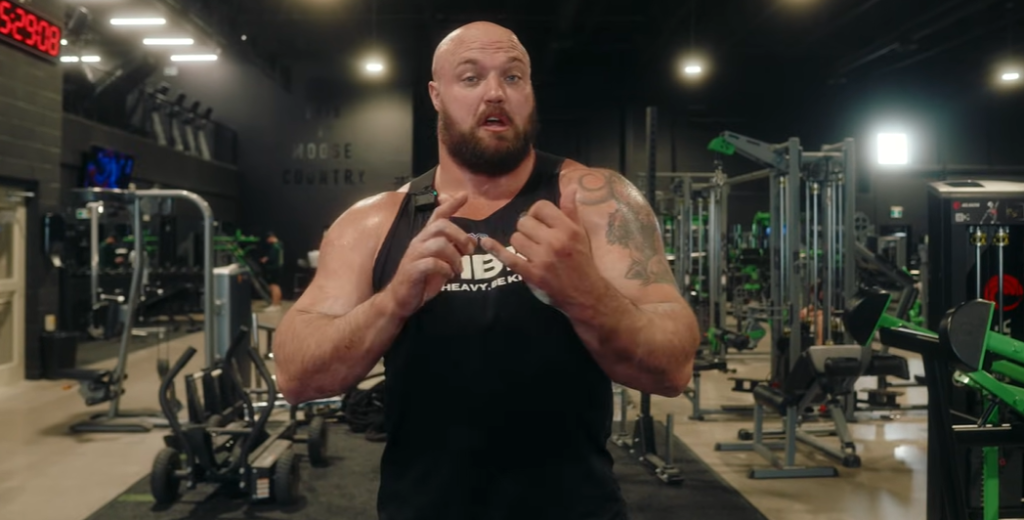Admired for his mastery of powerlifting and composed public persona, Mitchell Hooper now has to negotiate a landscape much more complicated than iron and asphalt. The couple’s relationship has taken a drastic, public turn after they celebrated an apparently perfect anniversary with Ashley Hooper only a few months ago. What started out as a series of mysterious social media posts has grown into an agonizingly detailed scandal that has forced both supporters and detractors to face their feelings in real time.
Ashley’s Instagram posts in recent days provided minimal room for interpretation. In reference to what many now believe to be an affair between Mitchell and her close friend—who also lived in their home as his assistant and served as her maid of honor—she said, “Some wounds come from the ones you trust most.” A private betrayal has been transformed into something nearly tragically theatrical by the intimacy of this triangle, which is especially painful.
Mitchell Hooper – Personal, Career & Relationship Details
| Attribute | Details |
|---|---|
| Full Name | Mitchell Hooper |
| Date of Birth | 29 September 1995 |
| Place of Birth | Midhurst, Ontario, Canada |
| Height | 6 ft 3 in (1.91 m) |
| Weight | 320–325 lb (145–147 kg) |
| Spouse | Ashley Hooper |
| Children | One daughter; second child expected |
| Occupation | Professional Strongman |
| Major Achievement | Winner, World’s Strongest Man 2023 |
| Public Controversy | Alleged infidelity involving wife’s best friend/assistant |
| Reference Source | https://en.wikipedia.org/wiki/Mitchell_Hooper |
Mitchell’s previously impeccable reputation was severely damaged when he acknowledged sending a woman suggestive and forward-looking messages. In an unusually candid moment, he revealed, “There have been personal matters… including discussions about the future and, at times, explicit topics.” Despite being incredibly honest, this post did little to moderate the public’s response.

The carefully crafted image of loyalty, stability, and clean-cut masculinity that Mitchell had long projected made the betrayal more painful for many observers. It now appears that his previous remarks regarding fellow Strongman Luke Stoltman’s alleged infidelity were not only ironic but also hypocritical. “I hold no skeletons,” he wrote once. I lack the stamina to tell lies. That sentiment reads as a painful contradiction in the context of recent events, underscoring the brittleness of even the most well-organized personal narratives.
Through meticulously planned social media posts, Ashley was presented as Mitchell’s co-pillar of success as well as a partner. His brand’s relatability was once fueled by their child, their shared training life, and their travel photos. Ashley destroyed a story when she removed Mitchell from her platforms, not just a husband.
The timing is especially striking. Ashley is currently expecting their second child, which gives what could otherwise be written off as just another celebrity scandal more weight and sadness. Her reaction, which is tinged with stoicism and deep pain, is similar to that of well-known people who, following similar betrayals, also opted for calmness over conflict, such as Jennifer Garner or Cheryl Cole.
From a wider angle, Mitchell’s predicament draws attention to a persistent conflict between one’s private life and public persona. Aspirational branding is particularly effective in the fitness sector. Similar to a barbell slipping mid-lift and throwing everyone off balance, the erosion of trust spreads swiftly when an influencer like Mitchell, who based a portion of his platform on love and loyalty, falters.
Sponsors are also keeping a close eye on things. Brands have become much less tolerant of reputational risk in recent years. These days, athletes serve as both on- and off-stage behavior ambassadors in addition to being athletes. Even the best bench press numbers cannot prevent a contract cancellation if trust is damaged.
Ashley’s public persona is still gaining traction in the meantime. She has arguably spoken louder through her silence than she could have through an interview or press release. Online, supporters have come together to support her, sharing their personal stories, offering words of encouragement, and drawing attention to the emotional toll that these relationships often require of women. She has been compared to women like Adele and Khloé Kardashian, who publicly suffered but later changed their own narratives, for her dignity under duress.
This drama is not playing out in a vacuum. There is a noticeable pattern of relationship breakdowns occurring on digital platforms, especially in influencer-driven circles. The distinction between brand strategy, public consumption, and personal development is becoming more and more hazy, as evidenced by high-profile divorces broadcast on podcast microphones and YouTube families dissolving.
Mitchell might still be able to keep some of his audience by admitting his mistakes while maintaining some appearance of openness. After all, media cycles frequently feature redemption arcs. However, it’s obvious that strength by itself won’t be sufficient to replace what has been lost. He now has to contend with the eternal emotional calculus of trust, identity, and consequence rather than a physical foe.
This unraveling may be redemptive in that it makes room for honesty, both in interpersonal relationships and among audiences weary of carefully manicured perfection. Despite her severe injuries, Ashley Hooper serves as a reminder that strength isn’t always obvious. When done quietly, deliberately, and with dignity, it can occasionally be incredibly effective.
It’s unclear if Mitchell will be able to make amends, change, or redefine himself. It’s clear that strength—real strength—is now determined by how you get back up after everything you’ve worked so hard to achieve has collapsed, rather than by how much you can lift.

